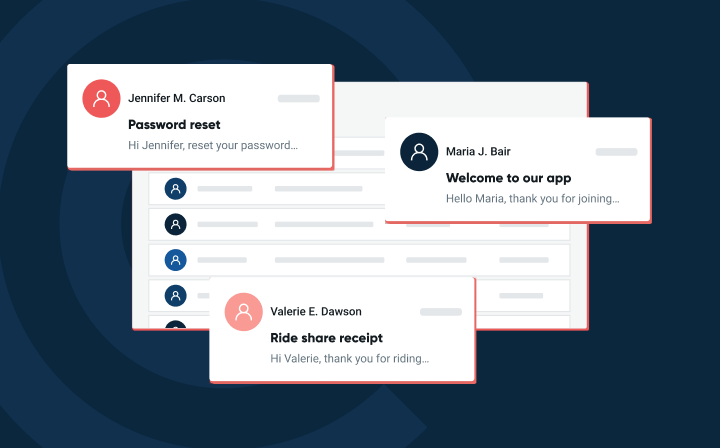Summary
The collective advice indicates that separating marketing and transactional emails using different IPs, subdomains, or IP pools is a recommended practice, especially when marketing practices aren't perfect or sending high volumes. This separation primarily serves as a defensive strategy to protect the deliverability and sender reputation of critical transactional emails. However, if email practices are excellent, recipient permission is well-managed, and email filtering by ISPs is sophisticated, strict separation may not be mandatory. Furthermore, low-volume dedicated IPs can establish a good reputation, decreasing the criticality of high sending volumes. Cost, complexity of managing multiple reputations, and the need for clarity for recipients also play a role in deciding on the best approach.
Key findings
- Reputation Protection: Separation protects transactional email reputation from potentially negative impacts of marketing campaigns.
- Good Processes: Effective email practices can reduce the need for separation.
- Volume Less Critical: Low-volume dedicated IPs can establish a good reputation.
- Defensive Strategy: Primarily a defense against poor marketing practices impacting transactional emails.
- ISP Filtering: Modern ISPs are better at filtering based on more than just IP.
- Reputation Isolation: Separate IP pools isolate reputation, preventing deliverability issues in one stream from affecting others.
- Control and Monitoring: Dedicated IPs provide control, but require diligent monitoring.
- Industry Best Practice: Following email best practices across sender reputations is a key practice for senders.
- IP warming: Consistent volumes are key for IP warming, so separation is still a good idea for marketing and transactional
Key considerations
- Marketing Quality: Assess the quality of current marketing practices and recipient permission management.
- Volume: Consider volume and the need for IP separation.
- Complexity: Weigh the complexity of managing multiple IP reputations.
- Cost: Evaluate the costs associated with dedicated IPs vs. shared IPs.
- ISP Capabilities: Understand filtering capabilities of ISPs.
- Company Size: Larger companies might benefit more from subdomain separation.
- Clarity: Recognise that subdomains can provide increased clarity to customers.
- Industry Regulations: Ensure your practices align with industry standards and legal requirements.
- IP Warm-Up: Understand that IP warm-up practices will require consistent volume and engagement.
What email marketers say
9 marketer opinions
The responses present a nuanced view on separating marketing and transactional emails. While some suggest it's not always necessary, separating these email types via different IPs or subdomains is generally recommended to protect sender reputation and ensure high deliverability for critical transactional emails. The primary reason is to isolate the reputation of transactional emails from the potential negative impact of marketing campaigns, which may have higher complaint rates or less engaged audiences. However, some argue that with good email practices, separation might not be required.
Key opinions
- Reputation Protection: Separating marketing and transactional emails safeguards the reputation of transactional emails, which are crucial for deliverability.
- Segmentation: Using subdomains segments sending reputation, isolating deliverability issues to specific email types.
- Best Practice: While not universally mandated, separating email types is a recommended best practice for maintaining optimal email deliverability.
- Cost Considerations: Shared IPs can be more cost-effective for marketing emails, while dedicated IPs are often preferred for transactional emails.
- Good Practices: Good sender practices might negate the need for strict separation.
Key considerations
- Sender Reputation: Consider the potential impact of marketing campaigns on the overall sender reputation and the importance of transactional email deliverability.
- Email Volume: Consider whether separating based on volume is the right decision as low volume can still maintain a good reputation.
- Email Practices: Evaluate the existing email practices to determine if they are robust enough to maintain deliverability without strict separation.
- Segmentation Requirements: Assess the need for segmenting sender reputation based on the specific types of emails being sent.
- Company Size: Consider whether this is the best approach for a company, as smaller companies may not need separate subdomains.
- Clarity: Consider the clarity a subdomain can provide to your emails.
- Email Provider: Ensure that all providers are following email best practices.
Marketer view
Email marketer from Reddit explains that separating marketing and transactional emails by subdomains is a good idea for larger companies. This helps them to protect against the risk of marketing sends impacting transactional sends.
4 Feb 2024 - Reddit
Marketer view
Email marketer from Mailjet Blog explains that separating IP addresses for marketing and transactional emails helps maintain a good sender reputation. Transactional emails are critical and require a high level of deliverability, while marketing emails often have higher complaint rates.
1 Feb 2022 - Mailjet Blog
What the experts say
4 expert opinions
Experts suggest that separating marketing and transactional emails is primarily a defensive practice to protect transactional email reputation, especially when marketing practices aren't perfect or volumes are high. However, if excellent processes are in place and recipient permission is well-managed, separation may not be mandatory. Consumer ISPs are also better at filtering emails by factors beyond IP. Additionally, the necessity of high email volumes for dedicated IPs has decreased; low-volume dedicated IPs can still establish a good reputation. When warming up a dedicated IP, separation is important for a consistent approach.
Key opinions
- Defensive Practice: Separation is primarily a defensive strategy against poor marketing practices impacting transactional emails.
- Good Processes: Effective email processes and recipient management may eliminate the need for separation.
- Reduced Volume Concerns: Low-volume dedicated IPs can still build a good reputation, decreasing the criticality of high sending volumes.
- ISP Filtering: ISPs are increasingly sophisticated in filtering emails based on factors beyond IP address.
- IP Warm-Up: Consistent volumes and good practices are crucial during IP warm up, and separation is still an important factor to consider.
Key considerations
- Email Practices: Assess the quality of current marketing practices and recipient permission management.
- Sending Volume: Consider email volume. Despite volume not being critical, separation may still be needed when the company's practices are poor or it is a factor.
- ISP Capabilities: Acknowledge and understand the email filtering capabilities of the target ISPs.
- Reputation Management: Balance the benefits of IP separation against the complexity of managing multiple IP reputations.
- Warm-Up: Understand that the separation of mailstreams is a recommended practice when warming up IPs for consistent volume.
Expert view
Expert from Spam Resource explains that while not always mandatory, separating marketing and transactional email streams can protect your transactional email reputation. This is particularly important if your marketing practices aren't perfect or if you're sending high volumes.
28 Apr 2022 - Spam Resource
Expert view
Expert from Email Geeks explains that the separation of marketing and transactional emails on different IPs is a defensive practice, stemming from a lack of trust in obtaining proper recipient permission. If good processes are in place, separation isn't always necessary. Consumer ISPs are also better at filtering mail based on factors beyond IP address, reducing the need for separation.
23 Oct 2024 - Email Geeks
What the documentation says
4 technical articles
Email delivery documentation emphasizes the use of separate IP pools, dedicated IP addresses, or subdomains to isolate sender reputation for different email types (marketing vs. transactional). Maintaining a good IP reputation is critical for inbox placement, and separating email streams helps prevent deliverability issues in one stream from affecting others. Following email best practices and closely monitoring reputation metrics are also crucial.
Key findings
- Reputation Isolation: Separate IP pools isolate reputation, preventing issues in one email type from affecting others.
- Dedicated Control: Dedicated IPs offer control over sending reputation.
- Reputation Tracking: Reputation metrics for sending IPs are tracked by providers like Google, making it crucial to maintain a good reputation.
- Deliverability Improvement: Separating sender reputations increases the chances of emails reaching the inbox.
- Best Practices: Separating sending IPs aligns with email best practices.
Key considerations
- Reputation Monitoring: Closely monitor your sending reputation across all IP addresses.
- Best Practices: Implement and consistently follow email best practices.
- Deliverability Impact: Consider how deliverability issues in one email stream could impact overall email performance.
- Control vs. Complexity: Weigh the control offered by dedicated IPs against the complexity of managing multiple IP reputations.
- Tools and metrics: Utilize the available tools such as Google Postmaster tools to maintain positive IP reputations.
Technical article
Email marketer from Microsoft documentation describes that separating sender reputations via different IPs or Subdomains ensures a higher chance of getting your emails to the inbox. It also ensures that you are following email best practices.
29 Jan 2025 - Microsoft
Technical article
Documentation from Google Postmaster Tools explains that they track reputation metrics for sending IPs. Maintaining a good IP reputation is critical for ensuring emails reach the inbox, and separation of email types can help manage this.
31 Jan 2024 - Google
Are SPF, DKIM, and DMARC records necessary for transactional email servers not used for marketing?
Can I use two subdomains on one dedicated IP address for different email types?
How do Yahoogle (Yahoo and Google) distinguish between bulk marketing and transactional emails, and what are the requirements for unsubscribe links?
Should I separate transactional and marketing emails?
Should I use separate IPs or domains for transactional vs marketing emails?
Should I use separate subdomains for marketing and transactional emails?







